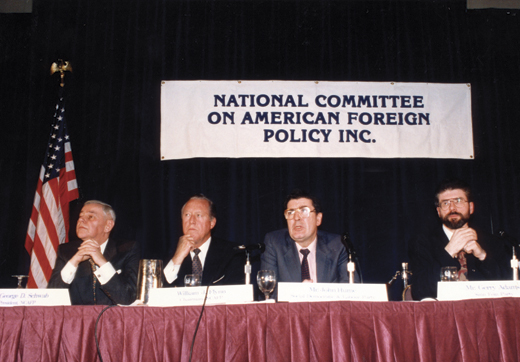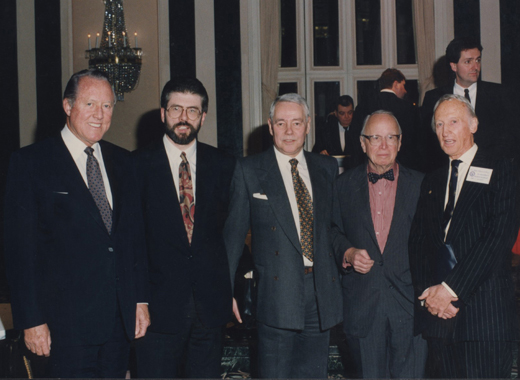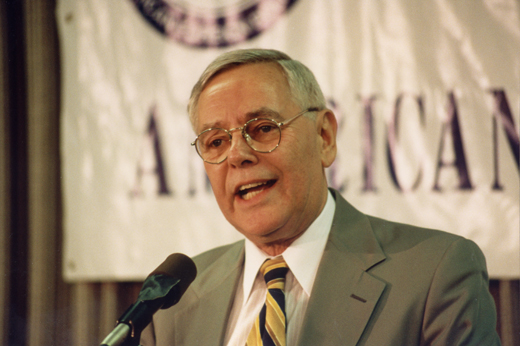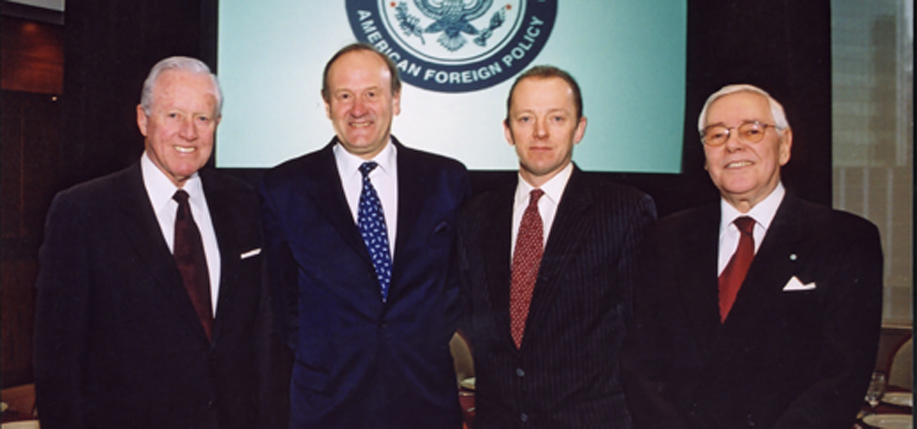Bill Flynn, the National Committee on American Foreign Policy, and the beginnings of the Northern Ireland peace process.
℘℘℘
The setting was the Elysée Palace in Paris. The event, a gathering of Nobel laureates in January 1988. The hosts, President François Mitterand, Nobel Peace Laureate Elie Wiesel, and the newly established Elie Wiesel Foundation for Humanity. The individual who helped to make the gathering possible was William J. Flynn, chairman of Mutual of America.
At that gathering Dr. Carol Rittner of the Sisters of Mercy and the first director of the Elie Wiesel Foundation introduced me to Bill Flynn and his wife, Peg. In the course of the week that I spent there in my capacity as disarmament adviser to Professor Wiesel, I began to interact with Bill Flynn, who expressed an interest in the National Committee on American Foreign Policy (NCAFP) that I had co-founded in 1974 with, among others, Professor Hans Morgenthau, a leading political realist in foreign policy and father of international relations studies.
Back in New York, Bill Flynn joined the NCAFP and from time to time attended foreign policy briefings. As often happens in nongovernmental organizations, the NCAFP began to experience financial problems. Sister Carol, with whom my wife, Eleonora, and I had become close friends, was determined that the NCAFP would survive and kept urging me to speak to Bill Flynn about our financial straits.
The setting was the Red Blazer restaurant in the theater district on West 46th Street. It had a dance floor and the well-known Vince Giordano Nighthawks orchestra. When I arrived with Eleonora, Bill Flynn was already at the table in the company of Sister Carol and two senior executives of Mutual of America, Stephanie Kopp and Linda DeHooge. We drank, we danced, we dined, and we talked about practically everything except our financial troubles. Sister Carol kept kicking me under the table, whispering, “Get on with it,” “What is the matter with you?” “Ask already.” All I managed to say was “I can’t.” This went on for some time until I summoned my nerve and told Bill Flynn of the financial crisis we faced at the NCAFP. He listened and came straight to the point, asking me gently how much it would take to keep the organization going. My reply: to keep it afloat we will need an infusion of $10,000, but to put the NCAFP on a solid foundation, $20,000 would work. Bill looked at me with a smile and said, “You will get a check,” and one arrived in the latter amount.
In return for Bill’s generosity, I invited him to become an officer of the organization. After a few days’ reflection he accepted the chairmanship, a responsibility he continues to discharge. To keep expenses down he invited me to move the NCAFP office to the Mutual of America complex at 666 Fifth Avenue and subsequently to the Mutual of America building at 320 Park Avenue, space we continue to occupy thanks to him and to Thomas J. Moran, who is now chairman, president, and CEO of Mutual of America and a member of the NCAFP’s Executive Committee.

Gradually Bill began to talk to me about the troubles in Northern Ireland, a topic I knew about through Edwina McMahon, copy editor of the NCAFP’s bimonthly publication, American Foreign Policy Interests, formerly American Foreign Policy Newsletter, and a keen observer of developments in Northern Ireland. Starting in the mid-1980s she discussed her belief in the need for the NCAFP, a nonpartisan organization dedicated to articulating U.S. national security interests within the framework of Hans Morgenthau’s political realism, to become involved. I invited her to write for our bimonthly publication about the troubles and how the issue affected U.S. interests, which she did in 1988.
After the Downing Street Declaration proclaimed the right of the people of Northern Ireland to self-determination in December 1993, Bill Flynn sprang into action. He began to push hard for the NCAFP to become engaged in helping to resolve the conflict and suggested that the organization host a conference in New York with the major players in the conflict, including Gerry Adams, head of Sinn Féin and reputedly a former chief of the IRA, and two Unionist leaders, James Molineaux, head of the Ulster Unionist Party, and the Reverend Dr. Ian Paisley, head of the Democratic Unionist Party. Bill always thinks big, and so he concluded that the best way to publicize the conference would be a full-page ad in The New York Times.
To a former Sternist like me, the idea of admitting the outlaw Adams to the United States for a hearing was thrilling. To the NCAFP’s Executive Committee, the idea of such a conference featuring Adams came as a bombshell even though its members knew that Morgenthau advocated diplomacy not only with friends but also with enemies. My immediate task was to find a hook that would accord with the NCAFP’s mandate to help friends and enemies resolve conflicts that impinge on U.S. national security. On the surface the troubles appeared idiosyncratic, but not when one actually analyzed the situation: Britain at the time was beset by a deep economic downturn and could ill afford to spend between six and seven billion dollars annually in Northern Ireland on a population of about one and a half million people. It was only a matter of time until an expenditure of that magnitude would affect Britain’s commitments to NATO, the Middle East, and elsewhere where British interests parallel those of the United States.
Bill handled the Executive Committee meeting brilliantly, and following very spirited discussions the Committee finally went along and the ad appeared. Invitations went out to Adams, Molineaux, and Paisley, as well as to John Hume, leader of the Social Democratic and Labor Party, and Dr. John Alderdice, leader of the Alliance Party. Nothing, not even the fact that the State Department refused to issue a visa to Gerry Adams, could make Bill lose faith that the conference attended by the Sinn Féin leader would take place at the Waldorf-Astoria on the date scheduled. Without the presence of Adams, I felt that the conference would be a fiasco and counseled Bill to call it off. He would sanction nothing of the kind and worked hard behind the scenes with Senator Edward Kennedy; Ambassador to Ireland Jean Kennedy Smith: Tony Lake, President Clinton’s national security adviser: Lake’s deputy, Nancy Soderberg, and others to persuade President Clinton not to miss this brilliant opportunity to bring the opposing parties to the table. Eventually the president saw the merits of the conference and approved a visa for Gerry Adams.
Three dates constitute defining moments for the justification offered by Bill Flynn and the NCAFP for our involvement in the Northern Ireland troubles: February 1, 1994; April 12, 1994; and October 24, 1994.
From the moment I officially welcomed Gerry Adams at Kennedy after he received a 48-hour visa, the NCAFP’s conference became a media spectacular. After the huge press conference at the airport, Sister Carol, the conference director, and I checked Adams into the Waldorf-Astoria under the nom de plume Shlomo Breznitz, a “noted Israeli scholar.” At the daylong Waldorf-Astoria conference that Bill Flynn presided over on the following day, February 1, 1994, some 80 representatives of the print and electronic media covered the proceedings. The pro and con demonstrations across the street on Park Avenue received their share of press exposure, as did Adams’s departure on the following day.
Despite the fact that the Unionist leaders failed to attend, at the end of the day, Bill Smith; Ambassador Angier Biddle Duke, moderator of the conference and former president of the NCAFP; Tom Moran, and I concluded that the conference was a success. The three main speakers, Adams, Alderdice, and Hume, agreed that peace could be obtained provided that parties to the conflict came to the table and approached issues without hatred. In the words of Gerry Adams: “Conflict resolution requires dialogue and negotiation. . . . On behalf of Sinn Féin, let me reiterate once again that our party has always expressed our willingness to engage in discussions without preconditions. Our political priority is to advance the peace process based on inclusive negotiations. The development of open debate and dialogue can only assist such a process. No situation is improved by ignorance or misinformation.” His parting words to me at the airport reinforced my positive assessment of the NCAFP’s road ahead: “I will never forget what you have done to bring me over, and I promise not to disappoint you in your expectations.”

The enormous publicity the conference engendered took the Unionist leaders by surprise, and Bill received an inquiry from Dr. Paisley asking whether he would consider inviting him, Peter Robinson, MP, and the Reverend William McCrea, MP, in order to present the Unionist position to the NCAFP.
The fact that Reverend Paisley finally accepted the invitation, as did Mr. Molineaux separately, was at least an indication that the Unionists did not want to be left out from the track 1 1/2 process that was beginning to take shape. That perception helped to diminish the significance of the lambasting remarks made by Reverend Paisley at the conference in New York on April 12, 1994, about the Downing Street Declaration. According to Paisley, the Declaration was designed to initiate a “phony peace process inspired by Prime Minister John Major of Britain and Prime Minister Albert Reynolds of Ireland.” Mr. Paisley asserted that the “Downing Street Declaration . . . imposes the principle of self-determination by the people of Ireland as a whole, a principle that the British government has signed onto and that denies to Northern Ireland self-determination unless it is in some way compatible with the political desires of the Dublin government.” This extreme position left the door open for further talks.
Before the NCAFP could enter into track 1 1/2 discussions and public diplomacy – that is, engage fully with the principals, including government officials, on the one hand, and at open forums at which they could brief the public on the progress of the peace process, on the other hand – a missing link had to be filled. Bill Smith soon forged that link by inviting the Loyalists to come to New York.
Moved by the historic IRA cease-fire announcement on August 31, 1994, the Loyalists accepted Bill’s invitation on October 13, 1994. Ten days later I welcomed the political representatives of the Ulster Volunteer Force and the Redhand Commandos as well as the Ulster Defense Association at Kennedy Airport. In contrast to the Reverend Ian Paisley, the Loyalist leadership consisting of David Ervine, Gusty Spence, Billy Hutchinson, Gary McMichael, Joe English, and David Adams embraced the Downing Street Declaration. In the words of David Ervine: “I am not suggesting that the Downing Street Declaration is perfect. But it is a chance, a real chance, the first real chance, I have ever perceived, to take weapons out of Northern Irish politics.”
Having won the trust especially of Sinn Féin and the Loyalists, the NCAFP began a 14- year involvement in the peace process. In early 2008 the National Committee ended its successful project on Northern Ireland. The journey was extremely difficult, especially for Bill who was often called on at a moment’s notice by one party or another to travel immediately to Belfast or Dublin or to both cities to help defuse issues such as policing, for example, that threatened to undermine the peace process. To make absolutely certain that Belfast, Dublin, and London understood that it was a National Committee on American Foreign Policy project and not purely Irish-induced, I accompanied Bill Flynn to Belfast and 10 Downing Street on one occasion, and on another occasion, three other members of the NCAFP’s Executive Committee, Ambassador Fereydoun Hoveyda, William M. Rudolf, and Tom Moran, as well as NCAFP member Edward Kenney, senior vice president of Mutual of America, accompanied Bill and me. Back in New York, Bill and the NCAFP continued to receive streams of visitors directly involved in the peace process from Belfast and Dublin. Also visiting us were British officials and Washingtonians from the Clinton and Bush administrations, all of whom were directly involved in the peace process and some of whom addressed the National Committee at Mutual of America’s celebrated dining room on the 35th floor. The NCAFP’s senior fellow Edwina McMahon kept providing our membership and the foreign policy public with incisive articles published in our bimonthly, American Foreign Policy Interests.

Bill, in his inimitable style, introduced a new dimension to the National Committee’s track 1/1/2 diplomacy on Northern Ireland: hosting Sinn Féin and Loyalist guests at sumptuous working luncheon and dinner meetings at the 21 Club. I remember well, for example, the party that sprang up after I escorted the Loyalists from the airport to the Fitzpatrick Hotel on Lexington Avenue the afternoon before the conference convened on October 24, 1994. The guests, after the arduous trip from Belfast to London and on to New York, descended from their rooms about 20 minutes after check-in time, and Bill invited us all to a late afternoon and early evening bash at the hotel where our guests enjoyed the food and drinks and began to sing movingly nostalgic Irish songs. At about ten in the evening Bill said it was time to go to the 21 Club. Exhausted, I excused myself and learned early the next morning that the evening came to an end at two that morning. It was astonishing to observe that the Loyalists at eight in the morning looked as fresh as if they had slept for hours. We soon discovered that their performance matched their looks.
Another of many such memorable events that were set in the 21 Club took place in 2005 when we were certain that peace would break out soon. Following a working luncheon with Martin McGuinness, presided over by Bill but this time attended by the former honorary chairman of the National Committee Dr. Henry Kissinger and the present honorary chairman the Honorable Paul Volcker, Kissinger observed, as correctly reported in The New York Times, “If it could happen in Ireland, with the history of Ireland and the distrust, I’d like to think it could happen anywhere.”
To honor Bill for his extraordinary work and commitment to the peace process, the NCAFP’s Executive Committee unanimously voted to establish the William J. Flynn Initiative for Peace Award and name him the first to receive it at a stellar Waldorf-Astoria dinner in 1997, citing Bill’s “unswerving belief in the educability of men to live in peace with one another and . . . his courage in translating his faith into political action and in working tirelessly for peace in Northern Ireland.” Others so honored in subsequent years are Senator George J. Mitchell, the Honorable Hugh Carey, and Gerry Adams, MP. Another recipient, Britain’s secretary of state for Northern Ireland, the Right Honorable Dr. Marjorie Mowlam, struck an especially personal and warm note in her acceptance speech when she observed that “There are a lot of people in this room . . . who helped tremendously. I can’t name everybody because we’d be here too long. But I’ll just say George [Schwab], Bill [Flynn], and Tom [Moran] because they did make a difference, and they didn’t just make a difference in terms of what they did. They made a difference in terms of who they are.”
_______________
George D. Schwab is president of the Naional Committee on American Foreign Policy. ♦


Leave a Reply